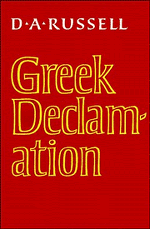3 - Teachers and theories
Published online by Cambridge University Press: 07 October 2011
Summary
Scio plura inventuros adhuc qui legere antiquos studiosius volent, sed ne haec quoque excesserint modum vereor.
‘I know that those who choose to read the ancients more carefully will find more; but I am afraid that even this has been too much.’
QuintilianThe setting was, at least in theory, sugar for the pill of useful instruction. But what was the content and method of this instruction? It is easy to dismiss it as arid and pointless. After all, it is a commonplace that rhetoric does not make orators; does not Cicero go beyond the rules whenever his confidence in his own powers and judgement impels him to do so? But the teachers have much to tell us, and we cannot hope to appreciate meletē without entering into their characteristic theories.
Much of their argument was concerned with what they call stasis (Latin status). Why the ‘issue’ should be called by this name was debated even in antiquity. As with many technical terms, its metaphorical origins were forgotten. Was it the ‘stance’ of the orator, approaching his opponent like a wrestler at the beginning of a bout? Was it simply the ‘quarrel’, for stasis means ‘dissension’ or ‘civil strife’ in classical Greek? The term became fixed certainly by the time of Hermagoras, but the principle of distinguishing types of issue is of course much earlier: we saw it suggested by the plan of Antiphon's Tetralogies, while Quintilian and others rightly saw the germs of it in Aristotle.
- Type
- Chapter
- Information
- Greek Declamation , pp. 40 - 73Publisher: Cambridge University PressPrint publication year: 1983
- 2
- Cited by



